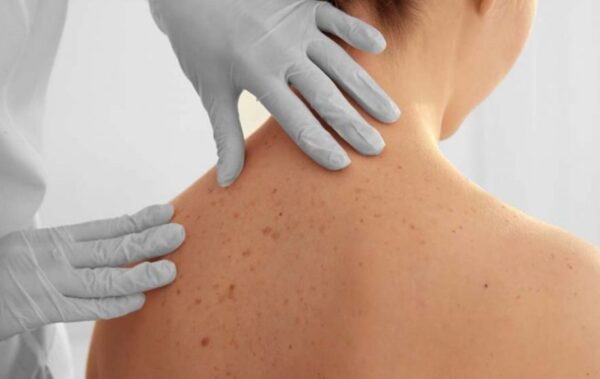
Skin cancer is something that affects more people than we often realize.
It’s the most common type of cancer worldwide, and the good news is that it’s largely preventable and treatable if caught early.
Let’s break it down in simple terms so you can understand what it is, how to spot it, and most importantly—how to protect yourself.
What is skin cancer?
Skin cancer happens when your skin cells start growing uncontrollably. Your skin is your body’s largest organ, and just like any other organ, it can develop cancer. It can show up in different ways, depending on the type of skin cancer you have.
Most common types:
-
-
Basal Cell Carcinoma (BCC): This is the most common and least dangerous form. It often looks like a small, shiny bump or a sore that doesn’t heal. It’s usually found in areas that get lots of sun.
-
Squamous Cell Carcinoma (SCC): It appears as red, scaly patches or sores that may bleed or crust over. It’s a little more aggressive than BCC but still treatable.
-
Melanoma: This is the most serious type of skin cancer. It typically starts as a new mole or changes in an old one. Melanoma can spread quickly to other parts of the body, so it’s crucial to spot it early.
-
Why does skin cancer happen?
The sun’s UV rays are responsible for most cases of skin cancer. UV rays can damage your skin cells, leading to abnormal growth over time. Tanning beds are also a big no-no since they expose you to harmful UV radiation.
Some people are more prone to skin cancer because of their genetics, fair skin, or family history. So, if you have lighter skin, freckles, or a lot of moles, you might want to keep an extra eye on your skin.
How to spot skin cancer (What to look for)
If you notice a mole or spot that changes shape, size, or color, it’s worth paying attention to. Keep an eye on any growths that itch, bleed, or look unusual.
How to prevent skin cancer
-
Sunscreen is Your Best Friend: Protect your skin with sunscreen every day, even when it’s cloudy. Use one with SPF 30 or higher, and reapply every two hours (especially if you’re swimming or sweating).
-
Seek Shade & Cover Up: If you’re out in the sun for extended periods, wear hats, sunglasses, and long sleeves. It’s not just about looking stylish; it’s about keeping your skin safe!
-
Avoid Tanning Beds: They might seem like a shortcut to a golden tan, but they’re a major risk factor for skin cancer. Sunless tanning options are a safer choice if you’re looking for some glow.
-
Know Your Skin: The more familiar you are with your skin, the easier it will be to spot changes. Do a quick check every month to look for any new spots or changes to old ones.
What happens if you get skin cancer?
Skin cancer is very treatable when caught early. In fact, most cases of basal cell and squamous cell carcinoma can be removed with a simple procedure. Melanoma, if caught early, has a high survival rate too.
-
Treatment options:
-
Surgery: The most common treatment. The doctor simply removes the cancerous cells.
-
Cryotherapy: Freezing off the cancer cells (think liquid nitrogen).
-
Topical treatments: Creams or ointments to treat less severe cases.
-
Chemotherapy or Immunotherapy: For more advanced skin cancers, these treatments can help kill cancer cells or boost your immune system to fight them off.
-
How to stay positive and proactive
If you’re ever unsure about a spot on your skin, see a doctor. It’s better to be safe than sorry, and early detection can save your life.
Skin cancer doesn’t just affect your body—it can take a toll emotionally. Reach out to loved ones, talk to your doctor, or find a support group to share your feelings and stay positive throughout the process.
Bottom line
Skin cancer can be serious, but it’s one of the most preventable and treatable cancers out there. By staying vigilant about sun safety, performing regular skin checks, and seeing a dermatologist for any concerns, you can protect yourself and stay ahead of any potential issues. Take care of your skin—it’s the only one you’ve got!
